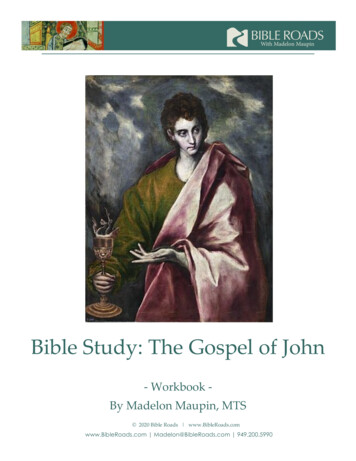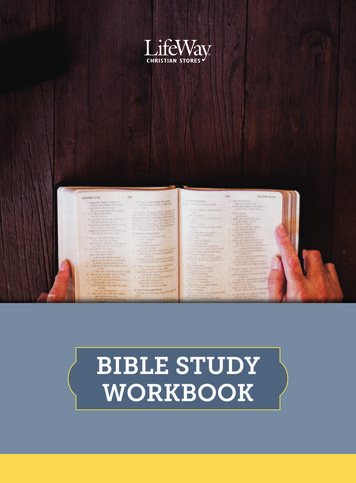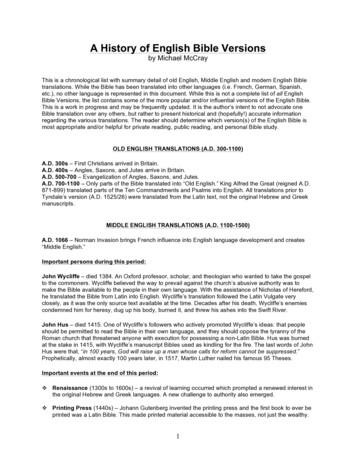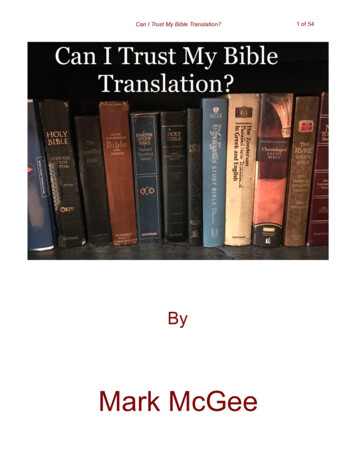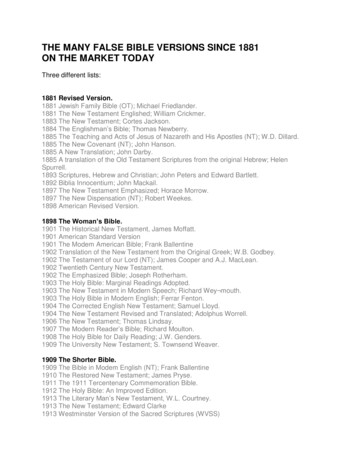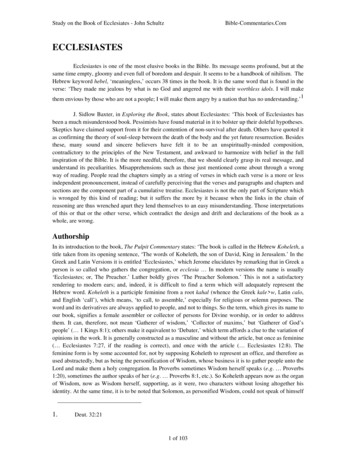
Transcription
Study on the Book of Ecclesiates - John tes is one of the most elusive books in the Bible. Its message seems profound, but at thesame time empty, gloomy and even full of boredom and despair. It seems to be a handbook of nihilism. TheHebrew keyword hebel, ‘meaningless,’ occurs 38 times in the book. It is the same word that is found in theverse: ‘They made me jealous by what is no God and angered me with their worthless idols. I will makethem envious by those who are not a people; I will make them angry by a nation that has no understanding.’1J. Sidlow Baxter, in Exploring the Book, states about Ecclesiastes: ‘This book of Ecclesiastes hasbeen a much misunderstood book. Pessimists have found material in it to bolster up their doleful hypotheses.Skeptics have claimed support from it for their contention of non-survival after death. Others have quoted itas confirming the theory of soul-sleep between the death of the body and the yet future resurrection. Besidesthese, many sound and sincere believers have felt it to be an unspiritually-minded composition,contradictory to the principles of the New Testament, and awkward to harmonize with belief in the fullinspiration of the Bible. It is the more needful, therefore, that we should clearly grasp its real message, andunderstand its peculiarities. Misapprehensions such as those just mentioned come about through a wrongway of reading. People read the chapters simply as a string of verses in which each verse is a more or lessindependent pronouncement, instead of carefully perceiving that the verses and paragraphs and chapters andsections are the component part of a cumulative treatise. Ecclesiastes is not the only part of Scripture whichis wronged by this kind of reading; but it suffers the more by it because when the links in the chain ofreasoning are thus wrenched apart they lend themselves to an easy misunderstanding. Those interpretationsof this or that or the other verse, which contradict the design and drift and declarations of the book as awhole, are wrong.AuthorshipIn its introduction to the book, The Pulpit Commentary states: ‘The book is called in the Hebrew Koheleth, atitle taken from its opening sentence, ‘The words of Koheleth, the son of David, King in Jerusalem.’ In theGreek and Latin Versions it is entitled ‘Ecclesiastes,’ which Jerome elucidates by remarking that in Greek aperson is so called who gathers the congregation, or ecclesia In modern versions the name is usually‘Ecclesiastes; or, The Preacher.’ Luther boldly gives ‘The Preacher Solomon.’ This is not a satisfactoryrendering to modern ears; and, indeed, it is difficult to find a term which will adequately represent theHebrew word. Koheleth is a participle feminine from a root kahal (whence the Greek kale w, Latin calo,and English ‘call’), which means, ‘to call, to assemble,’ especially for religious or solemn purposes. Theword and its derivatives are always applied to people, and not to things. So the term, which gives its name toour book, signifies a female assembler or collector of persons for Divine worship, or in order to addressthem. It can, therefore, not mean ‘Gatherer of wisdom,’ ‘Collector of maxims,’ but ‘Gatherer of God’speople’ ( 1 Kings 8:1); others make it equivalent to ‘Debater,’ which term affords a clue to the variation ofopinions in the work. It is generally constructed as a masculine and without the article, but once as feminine( Ecclesiastes 7:27, if the reading is correct), and once with the article ( Ecclesiastes 12:8). Thefeminine form is by some accounted for, not by supposing Koheleth to represent an office, and therefore asused abstractedly, but as being the personification of Wisdom, whose business it is to gather people unto theLord and make them a holy congregation. In Proverbs sometimes Wisdom herself speaks (e.g. Proverbs1:20), sometimes the author speaks of her (e.g. Proverbs 8:1, etc.). So Koheleth appears now as the organof Wisdom, now as Wisdom herself, supporting, as it were, two characters without losing altogether hisidentity. At the same time, it is to be noted that Solomon, as personified Wisdom, could not speak of himself1.Deut. 32:211 of 103
Study on the Book of Ecclesiates - John SchultzBible-Commentaries.Comas having gotten more wisdom than all that were before him in Jerusalem ( Ecclesiastes 1:16), or how hisheart had great experience of wisdom, or how he had applied his heart to discover things by means ofwisdom ( Ecclesiastes 7:23, 25). These things could not be said in this character, and unless we supposethat the writer occasionally lost himself, or did not strictly maintain his assumed personation, we must fallback upon the ascertained fact that the feminine form of such words as Koheleth has no special significance(unless, perhaps, it denotes power and activity), and that such forms were used in the later stage of thelanguage to express proper names of men If, as is supposed, Solomon is designated Koheleth in allusionto his great prayer at the dedication of the temple ( 1 Kings 8:23-53, 56-61), it is strange that no mentionis anywhere made of this celebrated work, and the part he took therein. He appears rather as addressinggeneral readers than teaching his own people from an elevated position; and the title assigned to him ismeant to designate him, not only as one who by word of mouth instructed others, but one whose life andexperience preached an emphatic lesson on the vanity of mundane things.’DateNelson’s Illustrated Bible Dictionary states: ‘King Solomon of Israel, a ruler noted for his great wisdom andvast riches, has traditionally been accepted as the author of Ecclesiastes. Evidence for this is strong, sinceSolomon fits the author’s description of himself given in the book: ‘I, the Preacher, was king over Israel inJerusalem. And I set my heart to seek and search out by wisdom concerning all that is done under heaven’(1:12-13). But some scholars claim that Solomon could not have written the book because it uses certainwords and phrases that belong to a much later time in Israel’s history. These objections by themselves arenot strong enough to undermine Solomon’s authorship. The book was probably written some time during hislong reign of 40 years, from 970 to 931 B.C.’ Solomon’s authorship has been accepted and refutedthroughout the centuries. We will not enter into the controversy in the context of this study and simplyaccept the most ancient traditions that attribute the book to Israel’s wisest king.The message of EcclesiastesThe International Standard Bible Encyclopaedia probably makes the best comments about the content of thebook, stating: ‘In the preface the speaker lays down the proposition that all things are unreal, and that theresults of human effort are illusive (Eccl 1:2-3). Human generations, day and night, the wind, the streams,are alike the repetition of an unending round (vs 4-7). The same holds in regard to all human study andthinking (vs 8-11). The speaker shows familiarity with the phenomena which we think of as those of naturallaw, of the persistence of force, but he thinks of them in the main as monotonously limiting humanexperience. Nothing is new. All effort of Nature or of man is the doing again of something which has alreadybeen done.After the preface the speaker introduces himself, and recounts his experiences. At the outset he hada noble ambition for wisdom and discipline, but all he attained to was unreality and perplexity of mind (vs12-18). This is equally the meaning of the text, whether we translate ‘vanity and vexation of spirit’ or ‘vanityand a striving after wind,’ (‘emptiness, and struggling for breath’), though the first of these two translationsis the better grounded.Finding no adequate satisfaction in the pursuits of the scholar and thinker, taken by themselves, heseeks to combine these with the pursuit of agreeable sensations-alike those which come from luxury andthose which come from activity and enterprise and achievement (Eccl 2:1-12). No one could be in bettershape than he for making this experiment, but again he only attains to unreality and perplexity of spirit. Hesays to himself that at least it is in itself profitable to be a wise man rather than a fool, but his comfort isimpaired by the fact that both alike are mortal (vs 13-17). He finds little reassurance in the idea of laboringfor the benefit of posterity; posterity is often not worthy (vs 18-21). One may toil unremittingly, but what isthe use (vs 22,23)?2 of 103
Study on the Book of Ecclesiates - John SchultzBible-Commentaries.ComHe does not find himself helped by bringing God into the problem. ‘It is no good for a man that heshould eat and drink and make his soul see good in his toil’ (vs 24-26, as most naturally translated), even ifhe thinks of it as the gift of God; for how can one be sure that the gift of God is anything but luck? He sees,however, that it is not just to dismiss thus lightly the idea of God as a factor in the problem. It is true thatthere is a time for everything, and that everything is ‘beautiful in its time.’ It is also true that ideas of infinityare in men’s minds, ideas which they can neither get rid of nor fully comprehend (Eccl 3:1-18). Here aretokens of God, who has established an infinite order. If we understood His ways better, that might unravelour perplexities. And if God is, immortality may be, and the solution of our problems may lie in thatdirection. For a moment it looks as if the speaker were coming out into the light, but doubt resumes its holdupon him. He asks himself, ‘Who knoweth?’ and he settles back into the darkness. He has previouslydecided that for a man to ‘eat and drink, and make his soul enjoy good’ is not worth while; and now hereaches the conclusion that, unsatisfactory as this is, there is nothing better (vs 19-22).And so the record of experiences continues, hopeful passages alternating with pessimistic passages.After a while the agnosticism and pessimism recede somewhat, and the hopeful passages become morepositive. Even though ‘the poor man’s wisdom is despised,’ the speaker says, ‘the words of the wise heard inquiet are better than the cry of him that ruleth among fools’ (Eccl 9:17). He says ‘Surely I know that it shallbe well with them that fear God’ (8:12), no matter how strongly appearances may indicate the contrary.The gnomic sections are mostly free from agnosticism and pessimism. The book as a whole sumsitself up in the conclusion, ‘Fear God, and keep his commandments’ (Eccl 12:13).Of course the agnostic and pessimistic utterances in Eccl are to be regarded as the presentation ofone side of an argument. Disconnect them and they are no part of the moral and religious teaching of thebook, except in an indirect way. At no point should we be justified in thinking of the author as reallydoubting in regard to God or moral obligation. He delineates for us a soul in the toils of mental and spiritualconflict. It is a delineation which may serve for warning, and which is in other ways wholesomelyinstructive; and in the outcome of it, it is full of encouragement. In some passages the speaker in Ecclesiasteshas in mind the solution of the problems of life which we are accustomed to call Epicurean (e.g. Eccl 5:1820; 7:16-17; 8:15; but not 2:24) - the solution which consists in avoiding extremes, and in getting from lifeas many agreeable sensations as possible; but it is not correct to say that he advocates this philosophy. Herather presents it as an alternative.His conclusion is the important part of his reasoning. All things are vanity. Everything passes away.Yet (he says) it is better to read and use good words than bad words. Therefore because the Great Teacher iswise, he ever teaches the people knowledge, and in so doing he ever seeks good words, acceptable words,upright words, words of truth. ‘The words of the wise are as goads; and as nails well fastened’ (‘clinched atthe back’) (Eccl 12:11). Such are the words of all the great masters. So (he ends) my son, be warned! Thereare many books in this world. Choose good ones. And his conclusion is: Reverence the Mighty Spirit. Keepto good principles. That is the whole duty of man. For everything at last becomes clear; and ‘good’ standsout clearly from ‘evil.’’Michael A. Eaton, in Ecclesiastes, a commentary in the series of Tyndale Old TestamentCommentaries, states in his introduction, under the heading ‘The Enigma of Ecclesiastes,’ the following:‘The major interpretative problem of Ecclesiastes is to understand its apparent internal contradiction andvicissitudes of thought. At times the Preacher seems to be gloomy, pessimistic, a skeleton at the feast;everything comes under his lashing scorn: laughter, drink, possession, sex, work, wisdom, riches, honor,children, even righteousness. Yet, at other points he urges that we should enjoy life, that there is nothingbetter than to eat well, enjoy our labor, receive with gladness the riches God gives us but be content if hegives none. A man, he says, should seek wisdom and knowledge, drink his wine with a merry heart, and livejoyfully with the wife whom he loves. The Preacher’s argument and his relationship to Israelite orthodoxyseems ambiguous. At times he appears to overthrow everything Israel stood for; at other points we see thetraditional view of God as sustainer and judge of all things, who give life to men and who may beworshipped at Israel’s focal point, the temple. Thus one scholar describes the Preacher as ‘a rationalist, an3 of 103
Study on the Book of Ecclesiates - John SchultzBible-Commentaries.Comagnostic, a skeptic, a pessimist and a fatalist’ others regard his work as orthodox or as an indirectMessianic prophecy.’It may be helpful to remember that in the Old Testament canon, Ecclesiastes is wedged in betweenProverbs and The Song of songs, making it the second volume of a trilogy attributed to King Solomon. Thatperspective may be helpful, particularly if we look at Ecclesiastes as ‘the other side of the coin’ that isshown to us in Proverbs.Outline of the bookMichael A Eaton , in Ecclesiastes, gives the following outline, which we will follow throughoutthis study:I. PESSIMISM: ITS PROBLEMS AND ITS REMEDY 1:1-3:22a. Title 1:1b. The pessimist’s problem 1:2-2:23i. The failure of secularism 1:2-11ii. The failure of wisdom to satisfy secular life 1:12-18iii. The failure of pleasure-seeking to satisfy secular life 2:1-11iv. Life’s ultimate certainty 2:12-23c. The alternative to pessimism: faith in God 2:24-3:22i. The life of faith 2:24-26ii. The providence of God 3:1-15iii. The judgment of God 3:16-22II. LIFE ‘UNDER THE SUN’ 4:1-10:20a. Life’s hardships and life’s companions 4:1-5:7i. Oppression without comfort 4:1-3ii. Lonesome rivalry and its alternatives 4:4-6iii. A man without a family 4:7-8iv. The blessings of companionship4:9-12v. Isolation breeding folly4:13-16vi. The approach to God 5:1-7b. Poverty and wealth 5:8-6:12i. The poor under oppressive bureaucracy 5:8-9ii. Money and its drawback 5:10-12iii. Wealth – loved and lost 5:13-17iv. Remedy recalled 5:18-20v. Wealth and insecurity 6:1-6vi. Insatiable longing 6:7-9vii. An impasse 6:10-12c. Suffering and sin 7:1-8:1i. Instruction from suffering 7:1-6ii. Four dangers 7:7-10iii. The need of wisdom 7:11-12iv. Life under the hand of God 7:13-14v. Dangers along the way 7:15-18vi. The need of wisdom 7:19-22vii. The inaccessibility of wisdom 7:23-24viii. The sinfulness of man 7:25-29ix. Who is really wise? 8:14 of 103
Study on the Book of Ecclesiates - John SchultzBible-Commentaries.Comd. Authority, injustice and the life of faith 8:2-9:10i. Royal authority8:2-8ii. Life’s injustices 8:9-11iii. The answer of faith 8:12-13iv. The problem restated 8:14v. The remedy recalled 8:15vi. The enigma of life 8:16-9:1vii. ‘The sting of death’ 9:2-3viii. Where there’s life, there’s hope 9:4-6ix. The remedy of faith 9:7-10E. Wisdom and folly 9:11-10:20i. Time and chance 9:11-12ii. Wisdom unrecognized 9:13-16iii. Wisdom thwarted 9:17-10:1iv. Folly 10:2-3v. Folly in high places 10:4-7vi. Folly in action10:8-11vii. The fool’s talk10:12-14viii. The fool’s incompetence 10:15ix. Folly in national life 10:16-20III. THE CALL TO DECISION 11:1-12:8a. The venture of faith 11:1-6b. The life of joy 11:7-10c. ‘Today, when you hear his voice ’ 12:1-8IV. EPILOGUE 12:9-14Michael A. Eaton adds to his outline: ‘This leaves the following loose ends which warn us not toassume that all of this was too rigidly in the Preacher’s mind as he wrote: (i) 5:1-7 tags on the the end of 4:116 or introduces 5:8-6:12) but is not closely linked to either. One may speculate about a sequence of thought but no explicit link is found in the text. (ii) Although 3:16-22 coheres well with 2:24-3:15, it also leadsinto the problem of suffering in 4:1-3 (which has its own links in turn with 4:4-16). (iii) There is only a loosecoherence in the minor units of 7:1-8:1 and 8:2-9:10.’The TextI. PESSIMISM: ITS PROBLEMS AND ITS REMEDY 1:1-3:22A. Title 1:11 The words of the Teacher, son of David, king in Jerusalem:The Hebrew text opens with the words dabar qoheleth, ‘The words of the Preacher.’ Qoheleth isderived from the word qahal, meaning ‘to convoke,’ or ‘to assemble,’ ‘to preach.’ The Interlinear HebrewBible states that it is ‘used as a ‘nom de plume’, Koheleth.’The Pulpit Commentary observes about the word Koheleth: ‘It is found nowhere else but in thisbook, where it occurs three times in this chapter (vers. 1, 2, 12), three times in Ecclesiastes 12:8, 9, 10,and once in Ecclesiastes 7:27. In all but one instance (viz. Ecclesiastes 12:8) it is used without thearticle, as a proper name. Jerome, in his commentary, translates it, ‘Continuator,’ in his version5 of 103
Study on the Book of Ecclesiates - John SchultzBible-Commentaries.Com‘Ecclesiastes.’ It would seem to denote one who gathered around him a congregation in order to instructthem in Divine lore. The feminine form is explained in various ways. Either it is used abstractedly, as thedesignation of an office, which it seems not to be; or it is formed as some other words which are found witha feminine termination, though denoting the names of men, indicating a high degree of activity in thepossessor of the particular quality signified by the stem; or, as is most probable, the writer desired toidentify Koheleth with Wisdom, though it must be observed that the personality of the author often appears,as in Ecclesiastes 1:16-18; 7:23, etc.; the role of Wisdom being for the nonce forgotten.’About ‘son of David, king in Jerusalem,’ the commentary states: ‘The word ‘king’ in the title is shown bythe accentuation to be in apposition to ‘Koheleth’ not to ‘David;’ and there can be no doubt that thedescription is intended to denote Solomon, though his name is nowhere actually given, as it is in the twoother works ascribed to him ( Proverbs 1:1; Song of Solomon 1:1). Other intimations of the assumptionof Solomon’s personality are found in Ecclesiastes 1:12, ‘I Koheleth was king,’ etc.; so in describing hisconsummate wisdom ( Ecclesiastes 1:13, 16; 2:15; comp. 1 Kings 3:12; 5:12), and in his being theauthor of many proverbs ( Ecclesiastes 12:9; comp. 1 Kings 4:32) — accomplishments which are notnoted in the case of any other of David’s descendants. Also the picture of luxury and magnificence presentedin Ecclesiastes 2. suits no Jewish monarch but Solomon. The origin of the name applied to him mayprobably be traced to the historical fact mentioned in 1 Kings 8:55, etc., where Solomon gathers all Israeltogether to the dedication of the temple, and utters the remarkable prayer which contained blessing andteaching and exhortation The term, ‘King in Jerusalem,’ or, as in ver. 12, ‘King over Israel in Jerusalem,’is unique, and occurs nowhere else in Scripture. David is said to have reigned in Jerusalem, when this seat ofgovernment is spoken of in contrast with that at Hebron ( 2 Samuel 5:5), and the same expression is usedof Solomon, Rehoboam, and others ( 1 Kings 11:42; 14:21; 15:2,10); and the phrase probably denotes atime when the government had become divided, and Israel had a different capital from Judah.’Bible scholars are not unanimous about the assumption that ‘son of David, king in Jerusalem’ is theobvious identification of King Solomon. Michael A. Eaton, in Ecclesiastes, writes: ‘Son of David, king inJerusalem refers to Solomon, but the artificial name ‘Mr. Preacher’ (for so it might be paraphrased) showsthat the writer is not seriously claiming to be Solomon. The book is a write-up of Solomon’s story; later weshall be told that the originator of the materials was a care writer, a wise man, a collector of proverbs (12:912).’The Adam Clarke’s Commentary states: ‘[The words of the Preacher] Literally, ‘The words ofQoheleth, son of David, king of Jerusalem.’ But the Targum explains it thus: ‘The words of the prophecy,which Qoheleth prophesied; the same is Solomon, son of David the king, who was in Jerusalem. For whenSolomon, king of Israel, saw by the spirit of prophecy that the kingdom of Rehoboam his son was about tobe divided with Jeroboam, the son of Nebat; and the house of the sanctuary was about to be destroyed, andthe people of Israel sent into captivity; he said in his word-Vanity of vanities is all that I have labored, andDavid my father; they are altogether vanity.’ The Wycliffe Bible Commentary adds: ‘Solomon, although notidentified by name, becomes the literary spokesman for the observations and convictions of the author. He isthe king in Jerusalem who, because of his wealth, wisdom, and worldly concern, has ample opportunity tosample all of life.’We will continue under the assumption of Solomon’s authorship of this book. The character of thisbook with its pessimistic and elusive references to the meaning of life, fits well the biographic informationgiven to us in the Old Testament. Solomon was given to accesses, as demonstrated in the acquisition of hisharem as well as in his pushing the limits of tolerance and wisdom. In a sense King Solomon was too smartfor his own good. His tolerance led him to idolatry and his wisdom to pessimistic inconclusiveness.6 of 103
Study on the Book of Ecclesiates - John SchultzB. The pessimist’s problemBible-Commentaries.Com1:2-2:23i. The failure of secularism 1:2-112 ‘Meaningless! Meaningless!’ says the Teacher. ‘Utterly meaningless! Everything is meaningless.’3 What does man gain from all his labor at which he toils under the sun?4 Generations come and generations go, but the earth remains forever.5 The sun rises and the sun sets, and hurries back to where it rises.6 The wind blows to the south and turns to the north; round and round it goes, ever returning on itscourse.7 All streams flow into the sea, yet the sea is never full. To the place the streams come from, there theyreturn again.8 All things are wearisome, more than one can say. The eye never has enough of seeing, nor the ear its fillof hearing.9 What has been will be again, what has been done will be done again; there is nothing new under thesun.10 Is there anything of which one can say, ‘Look! This is something new’? It was here already, long ago;it was here before our time.11 There is no remembrance of men of old, and even those who are yet to come will not be remembered bythose who follow.Michael A. Eaton, in Ecclesiastes, comments: ‘The preacher undermines confidence in the secularview of life by inviting his readers to face some basic facts: the futility of life (v.2), the consequences forman (3), the impossibility of getting rid of the earthly realm which embodies the problem (4), and theimplications all this has for man’s view of nature (5-7) and history (8-11).’There are two observations that must be made here. It has been said that the key to theunderstanding of each book in the Bible often hangs at the door. If applied to the book of Ecclesiastes, itmust be found in the inconsistency of the opening statement: ‘Meaningless! Meaningless! Utterlymeaningless! Everything is meaningless.’ If everything is literally meaningless, then so is the Teacher’sstatement! The fact that the Teacher makes an exception for his own words ought to give us a clue tounderstanding his message. If the word ‘meaning’ has lost its meaning, it means the death of language, itsmeans the death of thought and emotions, the death of man. So far no one in the world has accepted thatpremise. There is obviously one missing element in the Teacher’s argument and that makes the message ofthe book a quest for the missing link to meaning.Secondly, as was mentioned above, the Hebrew word hebel is used for the first time in Scripture inconnection with idols,1 suggesting that, if an idol embodies meaninglessness, true and ultimate meaning canonly be found in God. It is the Person of God who is the meaning of life and God’s revelation of Himself isexpressed in the word ‘meaning,’ as in the New Testament word logos, ‘Word.’ To the Old TestamentJewish mind the association of God with meaning and of idols with meaninglessness must have beenimmediately obvious. What makes the Teacher’s opening statement so enigmatic to us, must have been veryclear to them. What the Teacher seems to be saying is that everything becomes meaningless when we leaveGod out of the picture.The International Standard Bible Encyclopaedia equated logos with reason and thought. From anarticle about Logos we copy: ‘The doctrine of the Logos has exerted a decisive and far-reaching influenceupon speculative and Christian thought. The word has a long history, and the evolution of the idea itembodies is really the unfolding of man’s conception of God. To comprehend the relation of the Deity to theworld has been the aim of all religious philosophy. While widely divergent views as to the Divine1.See Deut. 32:21.7 of 103
Study on the Book of Ecclesiates - John SchultzBible-Commentaries.Commanifestation have been conceived, from the dawn of Western speculation, the Greek word logos has beenemployed with a certain degree of uniformity by a series of thinkers to express and define the nature andmode of God’s revelation. Logos signifies in classical Greek both ‘reason’ and ‘word.’ Though in BiblicalGreek the term is mostly employed in the sense of ‘word,’ we cannot properly dissociate the twosignifications. Every word implies a thought. It is impossible to imagine a time when God was withoutthought. Hence, thought must be eternal as the Deity. The translation ‘thought’ is probably the bestequivalent for the Greek term, since it denotes, on the one hand, the faculty of reason, or the thoughtinwardly conceived in the mind; and, on the other hand, the thought outwardly expressed through the vehicleof language. The two ideas, thought and speech, are indubitably blended in the term logos; and in everyemployment of the word, in philosophy and Scripture, both notions of thought and its outward expressionare intimately connected.’Interestingly, The Merriam-Webster Dictionary defines the word ‘vain’ as ‘of no real value: idle,worthless.’ Note the connection between the words ‘idle’ and ‘idol!’Michael A. Eaton , in Ecclesiastes, states about ‘vanity’: ‘Vanity of vanities is a Hebrewsuperlative: ‘Utter vanity!’ Vanity (hebel) includes (i) brevity and unsubstantiality, emptiness (NEB) speltout in Job 7 where the ‘vanity’ (v.16, Heb.) of man’s life is a ‘breath’ (v.7), an evaporating cloud (v.9), soonto be ended (v.8) and return no more (vv.9f.); (ii) unreliability, frailty, found also in Psalm 62 where God, a‘Rock’ and a ‘high tower’ (v.6), is compared with man who is ‘vanity’ (v.9), a ‘leaning wall’ and a ‘totteringfence’ (v.3); (iii) futility, as in Job 9:29 (Heb.), where ‘in vanity’ means ‘to no effect’; (iv) deceit (cf. Je.16:19; Zc. 10:2). Ecclesiastes includes each of these emphases. All is untrustworthy, unsubstantial; noendeavor will in itself bring permanent satisfaction; the greatest joys are fleeting. Between 1:2 and 12:8 thePreacher will echo this key statement about thirty times, showing that his book is in fact its exposition.Vanity characterizes all human activity (1:14; 2:11): joy (2:1) and frustration (4:4, 7-8; 5:10) alike, life(2:17; 6:12); 9:9), youth (11:10) and death (3:19; 11:8), the destinies of wise and foolish (2:15, 19), diligentand idle (2:21, 23, 26).’The first question asked in the quest for meaning is: ‘What does man gain from all his labor atwhich he toils under the sun?’ The Hebrew word used is yithrown, ‘preeminence,’ or ‘gain.’ The word isfound in no other book of the Bible; it is exclusive to Ecclesiastes. The question takes us back to Adam’s lastday in paradise, when God says to him: ‘Because you listened to your wife and ate from the tree about whichI commanded you, ‘You must not eat of it,’ Cursed is the ground because of you; through painful toil youwill eat of it all the days of your life. It will produce thorns and thistles for you, and you will eat the plants ofthe field. By the sweat of your brow you will eat your food until you return to the ground, since from it youwere taken; for dust you are and to dust you will return.’’1The fact that the question is asked indicates that something is missing. There ought to be meaningto life and to labor, but if returning to dust is all we can see, what is that meaning? Yet, everyone who hasever witnessed the birth of a baby knows that life has meaning, even if that meaning escapes definition. TheApostle John, probably, formulated the best definition of meaning, saying: ‘The world and its desires passaway, but the man who does the will of God lives forever.’2 And obedience to the will of God is closelylinked to the love of God. Jesus says: ‘If you love me, you will obey what I command.’3 It is ultimately lovethat gives meaning to life.The Teacher expresses the despair of returning to dust with the phrase: ‘Generations come andgenerations go, but
Study on the Book of Ecclesiates - John Schultz Bible-Commentaries.Com 1 of 103 ECCLESIASTES Ecclesiastes is one of the most elusive books in the Bible. Its message seems profound, but at the same time empty, gloomy and even full of boredo




